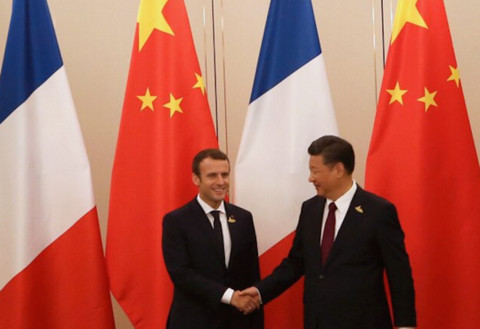[ad_1]

That 2020 would end with an old-fashioned bang and not with a whimper was written in the stars.
As it turned out, it wasn’t Boris Johnson who provided the fireworks, but Brussels itself, provoking fury by announcing a deal with China on a long-touted but hugely controversial investment and trade pact.
Distracted by the festive season, few had seen the move coming.
Europe’s big political guns only hastily showed their faces in a video call with Xi Jinping on 30 December.
It could not hide that a fundamental choice had been made, about how the Union relates to the world as a global power.
And while there is no denying this choice carries a considerable price tag, it is far from unreasonable.
Unquestionably, the EU welcomes Joe Biden’s arrival with a sigh of relief. But the continent has now made clear it is not about to rush headlong into America’s protective arms.
A more calculated approach prevails in post-Trump Europe, cognisant of the fact that EU and US interests have drifted apart, much further than most politicians care to openly admit.
Ever since Joe Biden was elected, hope has burgeoned that the West would quickly heal itself, with the US, in Biden’s own nostalgia-tinged words, “back at the head of the table”.
Evoking the old frame of a Washington-centred world, Biden’s national security adviser Jake Sullivan went so far as to chivvy the bloc to defer its China deal, seven years in the making. Clearly, the EU needed “coordination” with the White House, he said on Twitter.
By declining the summons, the EU showed it sees itself as a superpower in its own right, at least in trade. For requisitions by US presidents, be they liberal or populist, it has no time. Sovereign powers think, decide and are ready to act on their own.
Coordination with Washington is of course fine, if and when this proves an effective tool for asserting European interests, for example to counter distortions caused by Chinese state-owned enterprises.
But as long as the US has its own bilateral “Phase One” arrangements with China, handing US companies the edge over their European competitors, deferment of the EU’s trade deal with Beijing is an inexplicable act of economic and geopolitical self-harm.
Washington’s frustration with Europe is palpable, though difficult to rationally comprehend.
Democrats are said to be “perplexed and stunned”, the promise of a renewed, post-Trump West in tatters even before Trump has gone.
They would do well to get over it, stop fantasising about the West as it once was, and confront the world as it is today, starting with the rioters and scoundrels that stormed the US Capitol earlier this week.
There remains plenty of scope for Europe and the US to jointly raise the pressure on Xi Jinping, which is sorely needed. The only condition is that such pressure pays dividend on both sides of the Atlantic.
Europe’s investment deal also makes clear that the status of “systemic rival”, which the Union gave China in 2019, does not stop it from treating Beijing as a partner where this makes sense.
There is not going to be a Cold War 2.0.
While the EU is looking to protect its strategic industries and reduce supply-chain dependency in defined sectors, it still wants to trade on market terms in areas it views as less strategic. The real question is where to draw the line between the two.
Red lines?
Expect no answers from EU critics like Green MEP Reinhard Buetikofer. For them there are no lines.
Drawing boundaries is a form of cowardice and amoral cynicism. As long as strongman Xi misbehaves, as he again did in Hong Kong this month, there can be no trade deals at all, no interdependence or diplomacy with Beijing. Dictators cannot be appeased.
However, given China’s size and interconnectedness with Europe, a strategic policy of non-engagement hardly deserves the label “strategic”. We share a planet and a 1.3 billion people state will not magically disappear.
How can we get Xi to combat global warming? Is there any country that does not in some way bracket its systemic rivalry with Beijing?
Australia, New Zealand and Japan, proud democracies all, are no friends of China. It did not stop them from inking their own trade deal with China, only days after the Biden’s election.
Biden himself could have pledged to terminate or at least re-open the Phase One deal, for example to get Beijing to ratify fundamental ILO conventions. To the delight of Wall Street bankers, he vowed to maintain the status quo.
It was inevitable that Trump’s successor would be hailed as the ‘Great Healer’ of the West.
But Joe Biden’s tragedy is that he turned himself into the symbol of a pipedream. He talks about democracy, values and global leadership, even as the US’ standing in the world plunges to yet greater depths. Strongman Xi he calls a “thug”.
It is firm language, and not a word we are likely to hear from Charles Michel or Ursula von der Leyen, or from Macron or Merkel.
Still, for now, what they say about China sounds incalculably more strategic and savvy.
[ad_2]
Source link